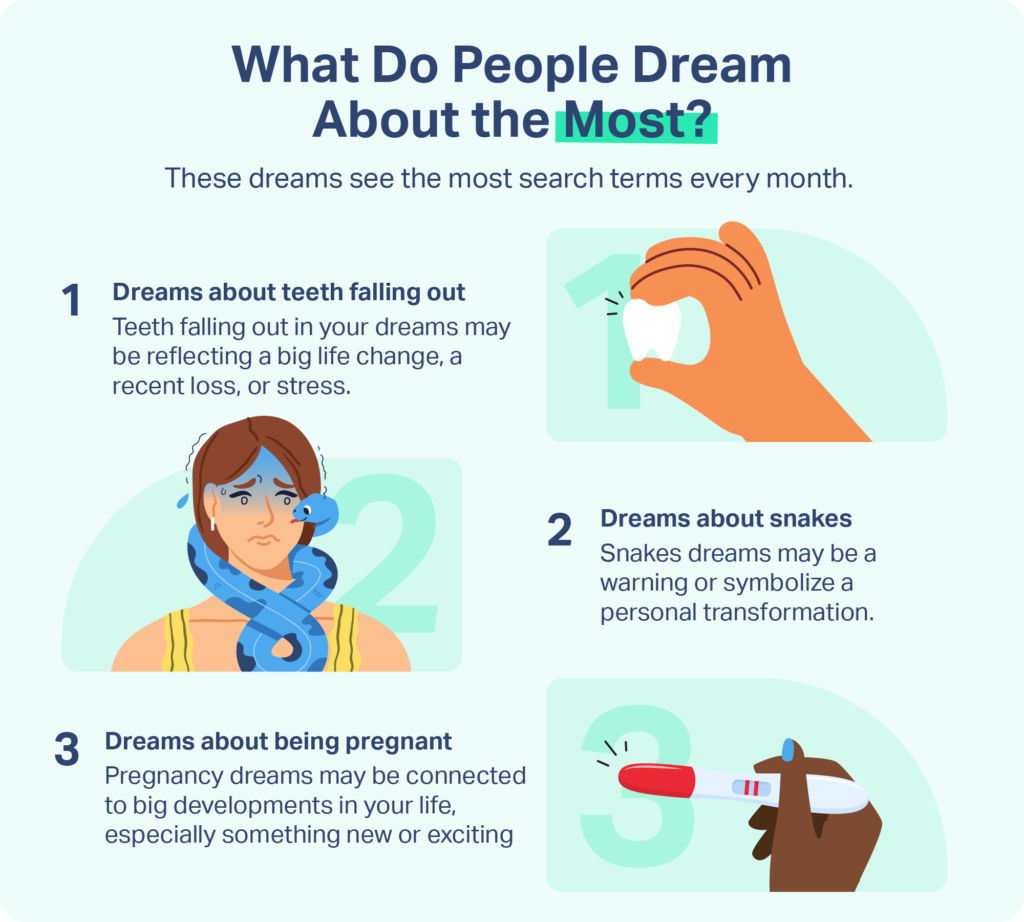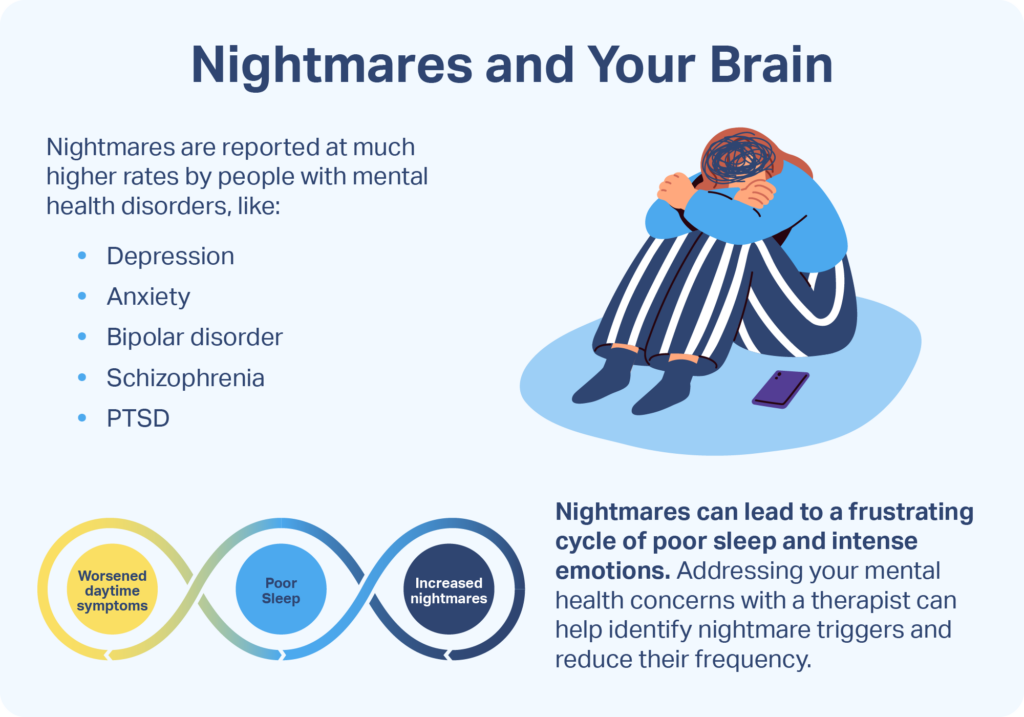
The Sleep Foundation editorial team is dedicated to providing content that meets the highest standards for accuracy and objectivity. Our editors and medical experts rigorously evaluate every article and guide to ensure the information is factual, up-to-date, and free of bias.
Table of Contents
Dreams are one of the most fascinating and mystifying aspects of sleep. Since Sigmund Freud helped draw attention to the potential importance of dreams in the late 19th century, considerable research has worked to unravel both the neuroscience and psychology of dreams.
Despite this advancing scientific knowledge, there is much that remains unknown about both sleep and dreams. Even the most fundamental question — why do we dream at all? — is still subject to significant debate.
While everyone dreams, the content of those dreams and their effect on sleep can vary dramatically from person to person. Even though there’s no simple explanation for the meaning and purpose of dreams, it’s helpful to understand the basics of dreams, the potential impact of nightmares, and steps that you can take to sleep better with sweet dreams.
A variety of issues can cause problems sleeping. Answer three questions to understand if it’s a concern you should worry about.
Snore loudly? Tired during the day? Wake up short of breath? See Your Risk Please select all optionsDreams are images, thoughts, or feelings that occur during sleep. Visual imagery is the most common Trusted Source National Library of Medicine, Biotech Information The National Center for Biotechnology Information advances science and health by providing access to biomedical and genomic information. View Source , but dreams can involve all of the senses. Some people dream in color while others dream in black and white , and people who are blind tend to have more dream components related to sound, taste, and smell Trusted Source National Library of Medicine, Biotech Information The National Center for Biotechnology Information advances science and health by providing access to biomedical and genomic information. View Source .
Studies have revealed diverse types of dream content, but some typical characteristics of dreaming include:
Although these features are not universal, they are found at least to some extent in most normal dreams.
Debate continues among sleep experts Trusted Source National Library of Medicine, Biotech Information The National Center for Biotechnology Information advances science and health by providing access to biomedical and genomic information. View Source about why we dream. Different theories Trusted Source Division of Sleep Medicine at Harvard Medical School A production of WGBH Educational Foundation and the Harvard Medical School Division of Sleep Medicine. View Source about the purpose of dreaming Trusted Source National Center for Biotechnology Information The National Center for Biotechnology Information advances science and health by providing access to biomedical and genomic information. View Source include:
Experts in the fields of neuroscience and psychology continue to conduct experiments to discover what is happening in the brain during sleep, but even with ongoing research, it may be impossible to conclusively prove any theory for why we dream.
On average, most people dream for around two hours per night. Dreaming can happen Trusted Source National Library of Medicine, Biotech Information The National Center for Biotechnology Information advances science and health by providing access to biomedical and genomic information. View Source during any stage of sleep , but dreams are the most prolific and intense during the rapid eye movement (REM) stage.
During the REM sleep stage, brain activity ramps up considerably compared to the non-REM stages, which helps explain the distinct types of dreaming Trusted Source National Library of Medicine, Biotech Information The National Center for Biotechnology Information advances science and health by providing access to biomedical and genomic information. View Source during these stages. Dreams during REM sleep are typically more vivid, fantastical, and/or bizarre even though they may involve elements of waking life. By contrast, non-REM dreams tend to involve more coherent content that involves thoughts or memories grounded to a specific time and place.
REM sleep is not distributed evenly through the night. The majority of REM sleep happens during the second half of a normal sleep period, which means that dreaming tends to be concentrated in the hours before waking up.
How to interpret dreams, and whether they have meaning at all, are matters of considerable controversy. While some psychologists have argued that dreams provide insight into a person’s psyche or everyday life, others find their content to be too inconsistent or bewildering to reliably deliver meaning.
Virtually all experts acknowledge that dreams can involve content that ties back to waking experiences although the content may be changed or misrepresented. For example, in describing dreams, people often reference people who they recognize clearly even if their appearance is distorted in the dream Trusted Source National Library of Medicine, Biotech Information The National Center for Biotechnology Information advances science and health by providing access to biomedical and genomic information. View Source .
The meaning of real-life details appearing in dreams, though, is far from settled. The “continuity hypothesis” in dream research holds that dreams and waking life are intertwined with one another and thus involve overlapping themes and content. The “discontinuity hypothesis,” on the other hand, sees thinking during dreams and wakefulness as structurally distinct.
While analysis of dreams may be a component of personal or psychological self-reflection, it’s hard to state, based on the existing evidence, that there is a definitive method for interpreting and understanding the meaning of dreams in waking, everyday life.

Dreams can take on many different forms. Lucid dreams occur when a person is in a dream while being actively aware that they are dreaming. Vivid dreams involve especially realistic or clear dream content. Bad dreams are composed of bothersome or distressing content. Recurring dreams involve the same imagery repeating in multiple dreams over time.
Even within normal dreams, there are certain types of content that are especially identifiable. Among the most recognizable and common themes Trusted Source National Library of Medicine, Biotech Information The National Center for Biotechnology Information advances science and health by providing access to biomedical and genomic information. View Source in dreams are things like flying, falling, being chased, or being unable to find a bathroom.
In sleep medicine, a nightmare is a bad dream that causes a person to wake up from sleep Trusted Source National Library of Medicine, Biotech Information The National Center for Biotechnology Information advances science and health by providing access to biomedical and genomic information. View Source . This definition is distinct from common usage that may refer to any threatening, scary, or bothersome dream as a nightmare. While bad dreams are normal and usually benign, frequent nightmares may interfere with a person’s sleep and cause impaired thinking and mood Trusted Source American Academy of Sleep Medicine (AASM)|National Library of Medicine, Biotech Information View Source during the daytime.

In most cases, dreams don’t affect sleep. Dreaming is part of healthy sleep and is generally considered to be completely normal and without any negative effects on sleep.
Nightmares are the exception. Because nightmares involve awakenings, they can become problematic if they occur frequently. Distressing dreams may cause a person to avoid sleep, leading to insufficient sleep. When they do sleep, the prior sleep deprivation can induce a REM sleep rebound that actually worsens nightmares. This negative cycle can cause some people with frequent nightmares to experience insomnia as a chronic sleep problem.
For this reason, people who have nightmares more than once a week, have fragmented sleep, or have daytime sleepiness or changes to their thinking or mood should talk with a doctor Trusted Source Medline Plus MedlinePlus is an online health information resource for patients and their families and friends. View Source . A doctor can review these symptoms to identify the potential causes and treatments of their sleeping problem.
For people who want to document or interpret dreams, remembering them is a key first step. The ability to recall dreams can be different for every person and may vary based on age Trusted Source National Library of Medicine, Biotech Information The National Center for Biotechnology Information advances science and health by providing access to biomedical and genomic information. View Source . While there’s no guaranteed way to improve dream recall, experts recommend certain tips Trusted Source American Psychological Association (APA) APA is the leading scientific and professional organization representing psychology in the United States, with more than 121,000 researchers, educators, clinicians, consultants and students as its members. View Source :
People with frequent nightmares that disturb sleep should talk with a doctor who can determine if they have nightmare disorder or any other condition affecting their sleep quality. Treatment for nightmare disorder often includes talk therapy that attempts to counteract negative thinking, stress, and anxiety that can worsen nightmares.
Many types of talk therapy attempt to reduce worries or fears, including those that can arise in nightmares. This type of exposure or desensitization therapy helps many patients reframe their emotional reaction to negative imagery since trying to simply suppress negative thoughts may exacerbate nightmares Trusted Source National Library of Medicine, Biotech Information The National Center for Biotechnology Information advances science and health by providing access to biomedical and genomic information. View Source .
Another step in trying to reduce nightmares is to improve sleep hygiene , which includes both sleep-related habits and the bedroom environment . Healthy sleep hygiene can make your nightly sleep more predictable and may help you sleep soundly through the night even if you have bad dreams. Examples of healthy sleep tips include: